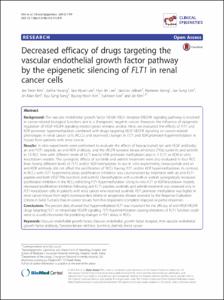Decreased efficacy of drugs targeting the vascular endothelial growth factor pathway by the epigenetic silencing of FLT1 in renal cancer cells
- Keimyung Author(s)
- Kim, Byung Hoon
- Department
- Dept. of Urology (비뇨의학)
- Journal Title
- Clinical Epigenetics
- Issued Date
- 2015
- Volume
- 7
- Issue
- 99
- Keyword
- Vascular endothelial growth factor; Vascular endothelial growth factor receptor; Anti-vascular endothelial growth factor antibody; Tyrosine kinase inhibitor; Sunitinib; Axitinib; Renal cancer
- Abstract
- Background: The vascular endothelial growth factor (VEGF)-VEGF receptor (VEGFR) signaling pathway is involved
in cancer-related biological functions and is a therapeutic target in cancer. However, the influence of epigenetic
regulation of VEGF-VEGFR signaling-related genes remains unclear. Here, we evaluated the effects of FLT1 and
KDR promoter hypermethylation combined with drugs targeting VEGF-VEGFR signaling on cancer-related
phenotypes in renal cancer cells (RCCs) and examined changes in FLT1 and KDR promoter hypermethylation in
tissues from patients with renal cancer.
Results: In vitro experiments were performed to evaluate the effects of beavacizumab (an anti-VEGF antibody),
an anti-FLT1 peptide, an anti-KDR antibody, and the VEGFR tyrosine kinase inhibitors (TKIs) sunitinib and axitinib
in 13 RCC lines with different levels of FLT1 and/or KDR promoter methylation and in 2 FLT1 or KDR in vitro
knockdown models. The synergistic effects of sunitinib and axitinib treatment were also evaluated in four RCC
lines having different levels of FLT1 and/or KDR methylation. In our in vitro experiments, bevacizumab and an
anti-KDR antibody did not affect the proliferation of RCCs having FLT1 and/or KDR hypermethylation. In contrast,
in RCCs with FLT1 hypermethylation, proliferation inhibition was counteracted by treatment with an anti-FLT1
peptide and both VEGF-TKIs (sunitinib and axitinib). Demethylation with sunitinib or axitinib synergistically increased
proliferation inhibition in the RCCs exhibiting FLT1 hypermethylation. Using in vitro FLT1 or KDR knockdown models,
decreased proliferation inhibition following anti-FLT1 peptide, sunitinib, and axitinib treatment was observed only in
FLT1-knockdown cells. In patients with renal cancer who received sunitinib, FLT1 promoter methylation was higher in
renal cancer tissues from eight nonresponders (stable or progressive disease assessed by the Response Evaluation
Criteria in Solid Tumors) than in cancer tissues from five responders (complete response or partial response).
Conclusions: The present data showed that hypermethylated FLT1 was important for the efficacy of anti-VEGF/VEGFR
drugs targeting FLT1 or intracellular VEGFR signaling. FLT1 hypermethylation causing alterations of FLT1 function could
serve as a useful biomarker for predicting changes in FLT1 status in RCCs.
- Keimyung Author(s)(Kor)
- 김병훈
- Publisher
- School of Medicine
- Citation
- Jee Yeon Kim et al. (2015). Decreased efficacy of drugs targeting the
vascular endothelial growth factor pathway
by the epigenetic silencing of FLT1 in renal
cancer cells. Clinical Epigenetics, 7(99), 1–14. doi: 10.1186/s13148-015-0134-9
- Type
- Article
- ISSN
- 1868-7075
- Appears in Collections:
- 1. School of Medicine (의과대학) > Dept. of Urology (비뇨의학)
- 파일 목록
-
-
Download
 oak-2015-0073.pdf
기타 데이터 / 1.87 MB / Adobe PDF
oak-2015-0073.pdf
기타 데이터 / 1.87 MB / Adobe PDF
-
Items in Repository are protected by copyright, with all rights reserved, unless otherwise indicated.